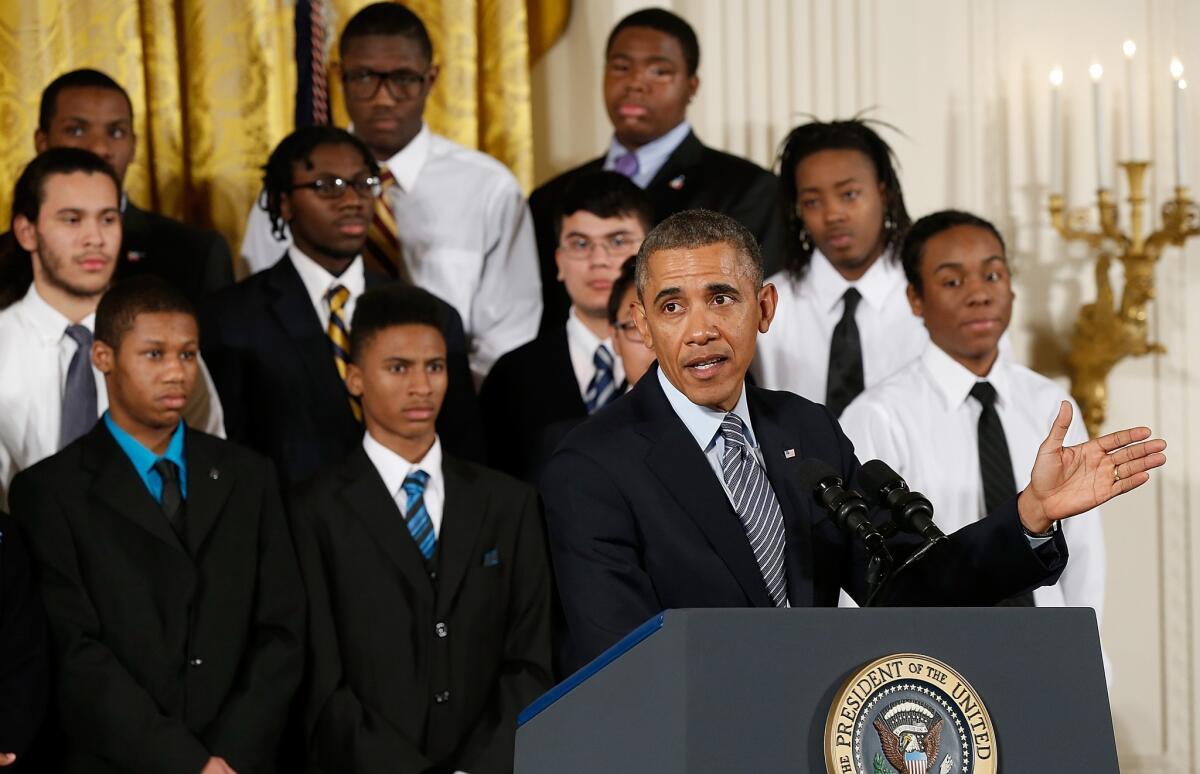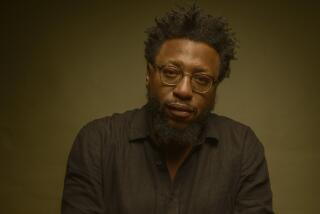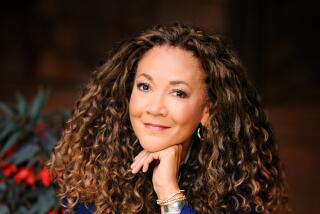Opinión: What Obama’s My Brother’s Keeper initiative means for black America

- Share via
A great paradox of Obama’s America is that racism has been so thoroughly condemned that it only rarely receives public attention. To some extent, the election of a black president relaxed what remained of our national focus on race matters, it triggered a prolonged self-congratulation and a deceptive notion that we had reached an ending, a resolution. Obama himself is, of course, a sophisticated, and very particular, thinker about race on a number of levels -- as a child of a mixed marriage, he saw race from the inside out and the outside in; as a local politician, he ran first in a traditional “black district” in Chicago for Congress, but lost to a master of old-style racial politics, Bobby Rush; and, finally, as a national candidate, he faced elimination because of his connection to a fiery preacher named Jeremiah Wright and then became the nation’s first African American president.
As president, Obama has been hesitant even to speak of race at all -- often opting for euphemisms like “urban,” a word we all understand to mean “black.” When it comes to race, he is measured, careful not to offend, or go too far and risk alienating anyone or taking a tone that might come off as “angry” or accusatory. He has told journalists repeatedly that he cannot afford to be seen as “the president of black America”; he must be seen, not least by centrists who may tilt Republican, as the president of the United States of America. But despite great caution, he could not always evade discussions of race. Every time there has been a racial “incident” -- the Jeremiah Wright tapes; the arrest of Henry Louis Gates Jr. in his own home; the death of Trayvon Martin -- Obama, in his own estimation, has had to walk a fine rhetorical line between honesty and reticence.
It is notable then, when Obama makes time to directly address issues specific to African Americans and other minorities without mincing his words. He has found such an occasion in the recent expansion of My Brother’s Keeper. The initiative is, in his words, “a more focused effort on boys and young men of color who are having a particularly tough time,” and it has served as perhaps the purest distillation of how the first black president in our nation’s history navigates the ever-intractable question of race.
Backed by a five-year, $200-million investment from a variety of foundations and businesses, My Brother’s Keeper is a public-private program that aims to provide mentoring and improve educational and professional opportunities. It is a serious undertaking that will certainly provide a real good to a desperately underserved, too often maligned community. Black youth unemployment is 38%, more than twice the rate for white youth, and fewer than half of young black men who enter high school graduate in four years, compared with 78% for young white men. Young men of color are also more likely to be poor, fall victim to violence, and become enmeshed in the criminal justice system. My Brother’s Keeper will certainly alleviate some of these maladies. Both in the implementation of its programs and the symbolic power of a black president discussing problems specific to young men of color, this is important.
But My Brother’s Keeper is also important for what it is not. The program involves no federal funding whatsoever, nor does it seek to implement any new policies. It also eschews any mention of the discrimination -- the long and painful history of institutional racism -- that continues to blight American life. Instead, it has been accompanied by a strikingly conservative rhetoric of “no excuses” that echoes previous invocations of the black “culture of poverty” and the misguided emphasis on personal responsibility.
“It will take courage,” Obama told a group of young men of color at a White House news conference in February, “but you will have to tune out the naysayers who say the deck is stacked against you, you might as well just give up or settle into the stereotype. It’s not going to happen overnight, but you’re going to have to set goals, and you’re going to have to work for those goals. Nothing will be given to you.”
Soon after the speech, Greg Gutfield of Fox News’ “The Five” commented, “This is great -- he’s a conservative!” Though many see such an exhortation as a great compliment to a common-sense policy, there are those who find it dispiriting. And with good reason. Obama seems to rely on the belief in education as the great equalizer, and yet African Americans with bachelor’s degrees make 20% less than their white counterparts. The reluctance to acknowledge ulterior forces -- forces outside of the opportunity gap, such as persistent institutional racism -- provides credence, however inadvertently, to the theory that people of color are to blame for their poverty. This isn’t a problem unique to the thinking of Obama -- instead, it speaks to a longstanding history of distorted views towards race in America.
Obama is hardly ignorant about this line of thinking. His book “Dreams From My Father” is a sophisticated memoir and exploration of racial identity that was clearly written with previous memoirs -- from Frederick Douglass’ to Richard Wright’s to Malcolm X’s -- in the background of the author’s thinking. As a law professor at the University of Chicago, Obama taught some of the seminal texts in African American thought across a range of views, including the central debate between W.E.B. DuBois and Booker T. Washington over whether the path to black salvation was patient accomodation or political activism. To write off Obama as a simplistic thinker or a pop conservative -- the political version of Bill Cosby -- is unfair and simplistic. Indeed, his “More Perfect Union” speech delivered in response to the Rev. Wright controversy and his comments following the George Zimmerman acquittal were nothing less than outstanding. Rather, Obama clearly feels constricted, by both his office and his era, as accusations of favoritism loom over his every move. Even the mild My Brother’s Keeper drew indictments of “blatant racism” from Rush Limbaugh. Bound by these forces, Obama tends to opt for a frustrating on-the-one-hand-on-the-other-hand brand of balance that often draws false equivalencies.
When Obama first came into office, many hoped and even presupposed that his presidency would fulfill the dream of the civil rights movement. But now, in the twilight of his career, it seems likely that the mere fact of his ascension will go down as his greatest contribution to black progress. His presidency, along with My Brother’s Keeper, have thus raised an urgent question: Has our first black president brought our country closer to racial equality, or proved the futility of such a notion? Facing the enduring will of American bigotry, the answer proves increasingly unsettling.
Follow @NoahRemnick for more news and opinions
More to Read
A cure for the common opinion
Get thought-provoking perspectives with our weekly newsletter.
You may occasionally receive promotional content from the Los Angeles Times.






